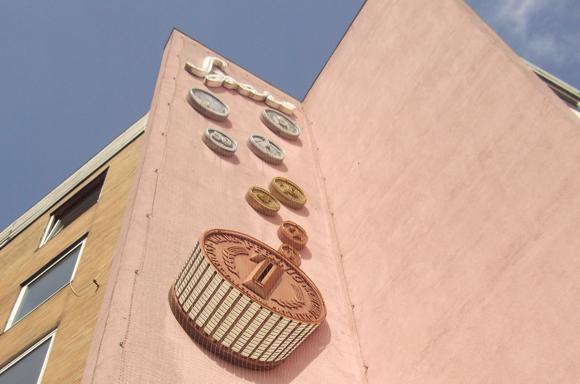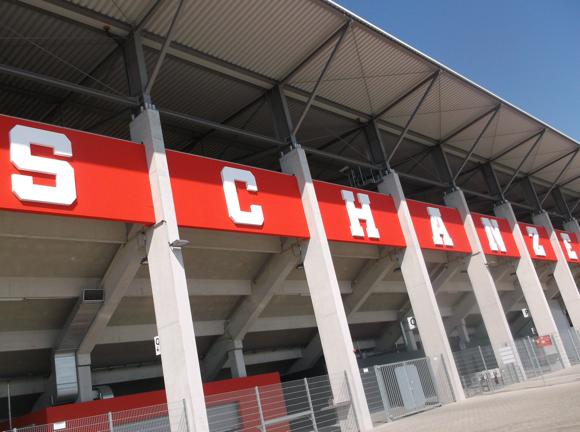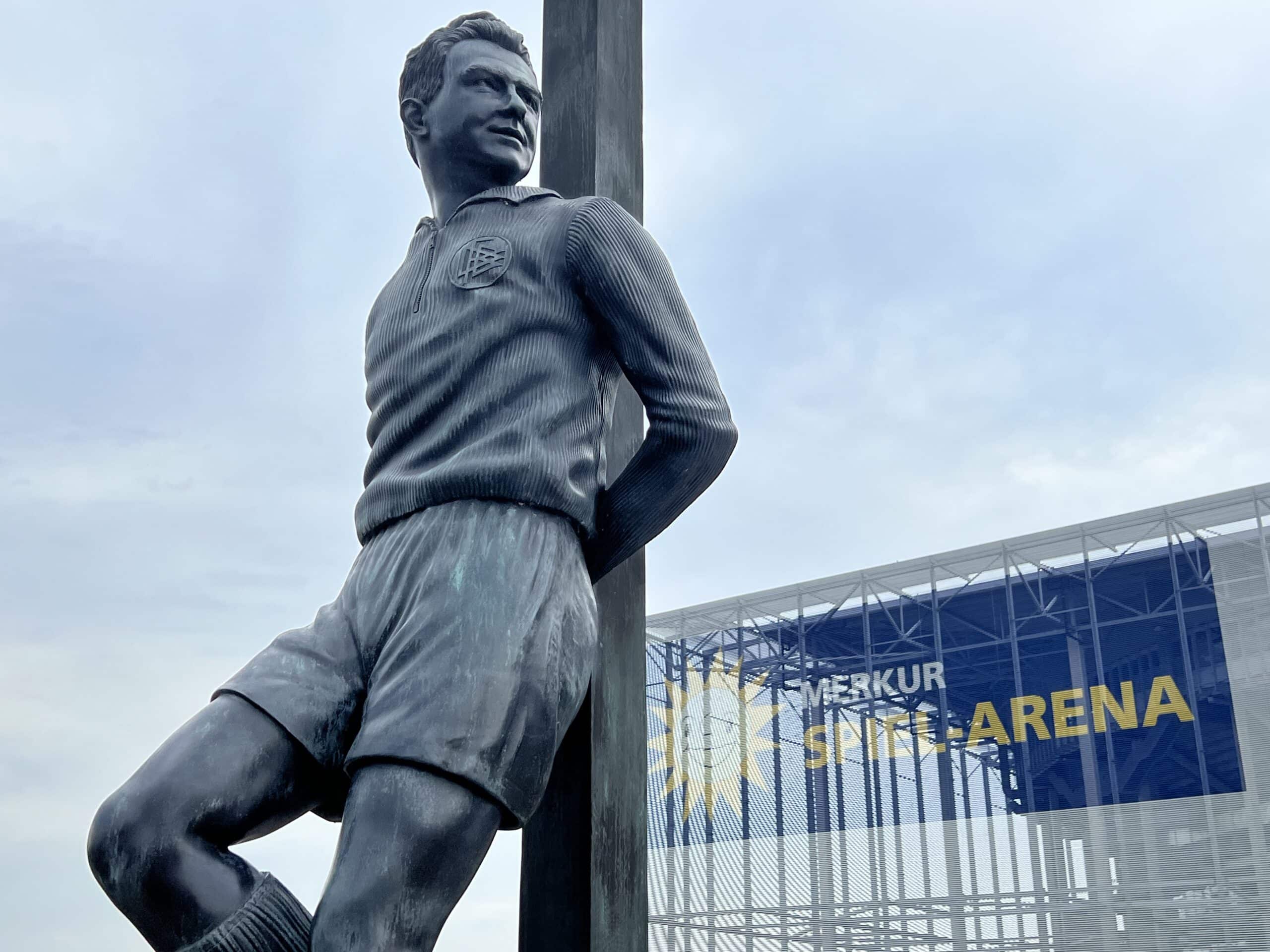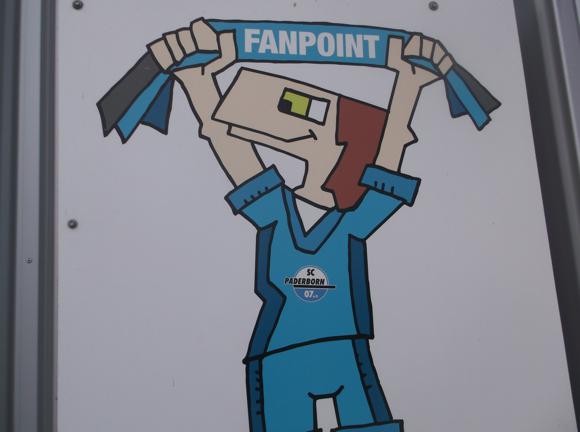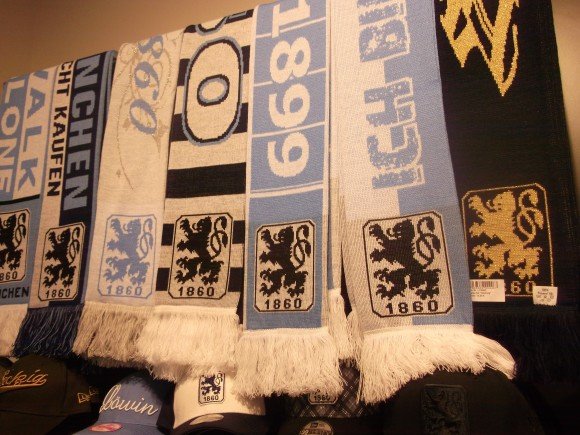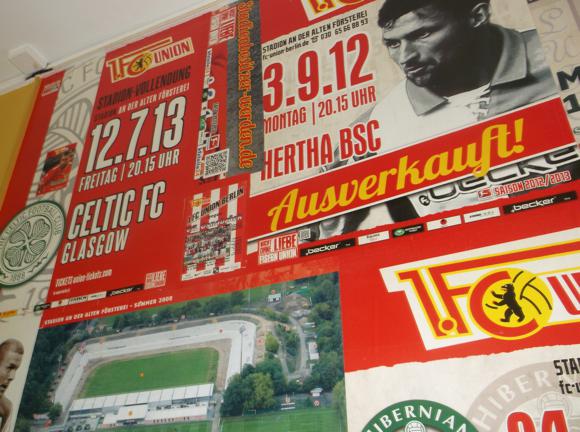A fan’s guide – the club from early doors to today
Relegated almost as quickly as they were promoted, Eintracht Braunschweig enjoyed a brief season in the Bundesliga in 2013-14 after a 28-year absence. Now it seems Eintracht may not be back as quickly as many had hoped, falling off the pace in the Zweite in 2014-15.
Fußball und Cricket Club Eintracht Braunschweig were founded in 1895. Ten years later, cricket was dropped, though the date, and Eintracht, remained.
Always a strong side in the various regional North German Championships, Eintracht were one of the first big sides to open their own stadium, before even Schalke and Nürnberg, in 1923.


With only one post-war season out of the top regional level, Eintracht were clear candidates for inclusion in the inaugural Bundesliga of 1963. In came manager Helmuth Johannsen and, a year later, high-scoring midfielder Lothar Ulsaß. With a rigid defence backed by 1970 World Cup reserve keeper Horst Walter, little-fancied Eintracht won an unlikely league title in 1967. A very late penalty and subsequent 1-0 play-off win by Juventus put paid to a semi-final place in the European Cup a year later.
Eintracht continued to maintain a steady presence in the league but after a couple of one-season dips, a third relegation in 1985 proved near permanent.
The Lions flitted between second and third flights until ex-Eintracht midfielder Torsten Lieberknecht stepped into the breach as manager just when most needed. Faced with fourth-league football in 2008, Eintracht’s players responded positively, climbing out of the third tier in 2011. Top league scorer that year was Congolese striker Domi Kumbela, a feat he would repeat one flight higher in 2012-2013.



With Bosnians Damir Vrančić and Ermin Bičakčić bolstering the defence, and attacking midfield captain Dennis Kruppke creating chances for Kumbela, Lieberknecht’s men led the Zweite until the spring. A dip in form had Eintracht’s significant fan base on tenterhooks – until Bosnian international Damir Vrančić stepped up to take a fateful free-kick in the 92nd minute. ‘Der Ball ist drin!! TOORRR!!’ screamed the Sky TV commentator has he struggled to summarise the enormity of the moment.
One strike, one goal and promotion for the champions of 1967. The town went bananas and this venerable club set about rapidly adapting their equally venerable stadium for Bundesliga duty.




Stadium Guide
The field of dreams – and the stands around it


Opened with a game against then mighty 1. FC Nürnberg in June 1923, the Eintracht-Stadion has witnessed nearly a century of club history. Holding 25,500 around a running track, the former Stadion Hamburger Straße is where the European Team Athletics Championships took place in 2014.
Hamburger Straße is the main road heading directly north from town. Before 1923, Eintracht ran out at a pitch on Helmstedter Straße, east of the station near the city’s main cemetery.
With a wooden stand in on the West Side, site of today’s Haupttribüne, the ground served Eintracht proudly either side of the war, which it survived, and was chosen to host the German Cup Final of 1955. For the Bundesliga, capacity was increased to 38,000, the 1967 title won before a full house – ironically, against Nürnberg.

With the financial strains of lower-league football, the club were forced to sell their ground to the City in 1981, and until 2008 it carried the unwieldy name of Städtisches (‘Municipal’) Stadion an der Hamburger Straße. With the club’s revival, local businesses bought it back and Eintracht-Stadion it remains today.
Renovations continued through the first half of 2013, with a new shop/ticket office and bar/restaurant earmarked for outside the main entrance alongside Hamburger Straße. Home fans occupy the Südkurve, particularly sectors 6-8 immediately behind the goal. Away fans are allocated half the Nordkurve, sectors 18 (seated) and 19 (standing). Seats in the sideline Osttribüne or main Westtribüne are the best in the house.
getting there
Going to the stadium – tips and timings

From platform C outside Braunschweig Hauptbahnhof, tram M1 (every 10mins, direction Wenden) takes just 20mins to run right through town to the Stadium (Schwarzer Berg) stop beside the stadium. Tickets are €2.10.
For Eintracht’s rare seasons in the Bundesliga, shuttle buses should also be laid on from the station.
getting in
Buying tickets – when, where, how and how much

During the 2013 rebuild, a temporary ticket office (Mon-Fri 10am-5pm) was set up, within the equally temporary shop, upstairs in the Osttribüne around sector 14. There’s another outlet in town in the Schloss Carree commercial centre, Ritterbrunnen 7 (Mon-Fri 10am-7pm, Sat 10am-8pm) and at the Konzert-Kasse on the ground floor of the nearby Schloss-Arkaden shopping centre on the main square.
The best seats (€33) are in sectors 1 and 4 of the main West Stand, and 11-13 of the facing Osttribüne. A seat beside the away end in the Nordkurve (sectors 15-17) is €24. Visiting fans pay €16/€24 to stand or sit. All the standing home end, the Südkurve, is €16. Advance purchase allows a €1 discount.
Online sales are available too.
what to buy
Shirts, kits, merchandise and gifts

A modest number of souvenirs are available in the temporary shop (Mon-Fri 10am-5pm, 2hrs before kick-off), upstairs in the Osttribüne around sector 14. Another outlet recently opened in the Schloss Carree commercial centre, Ritterbrunnen 7 (Mon-Fri 10am-7pm, Sat 10am-8pm). A permanent club shop is being set up in front of the Haupttribüne.
Popular items include the 192-page photo book Traum von Liga 1, a story of the 2012-13 season, and a DVD on the same subject.
Where to Drink
Pre-match beers for fans and casual visitors






Three small and very, very local bars are set alongside each on Rheingoldstraße near the Shell garage on the corner of Hamburger Straße: the match-day only Spektrum, scarves and pennants around the wooden bar counter; the 1967 Café, more a betting shop than bar, but with a vast Eintracht mural; and the open-when-it-kinda-wants-to Steh-Café, with ’67 paraphernalia, including that splash from the Braunschweiger Zeitung and a display of autographed Eintracht Panini stickers from the 1970s. Stubby brown bottles of Wolters are consumed with ferocity in a space just large enough for four tables.
Before any beer, fans load up on fine kebabs at the pleasant, sit-down Alpi’s Imbiß round the corner on Hamburger Straße (No.261), done out in yellow and blue.
For a quieter pre- or post-match beer, then the corner Wolters Lounge appeals to a neater crowd. On the other side of Hamburger Straße from the stadium near the tram stop, it opens 5pm Mon-Sat but makes a point of early trading on match days.

